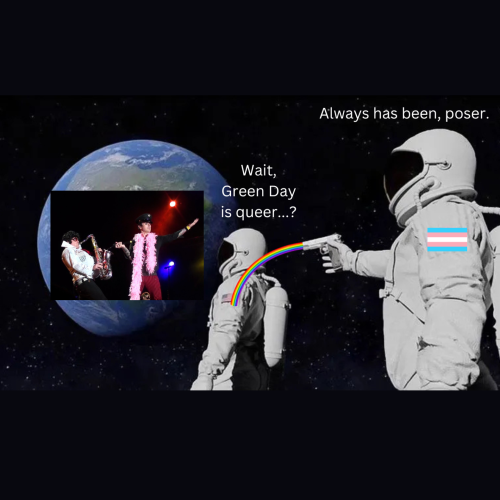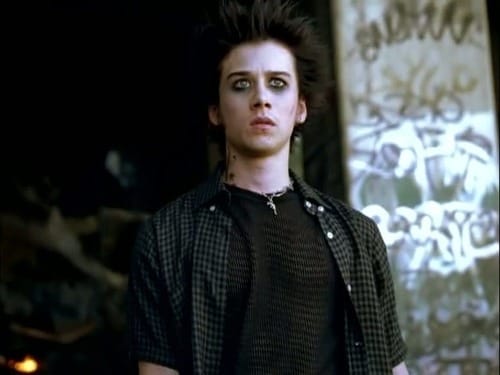Now I Wonder How Whatsername Has Been - 20 Years of Green Day’s Unintentionally Trans Classic

“To live and not to breathe / Is to die in tragedy.”
Adequately explaining or describing the cultural impact of Green Day’s 2004 political rock opera, American Idiot, is what the kids of today refer to as a Sisyphean task. A book that I have neither the energy nor resources to write, but who knows, maybe someday?
This topic has inhabited my noggin for years, and it took watching a recent performance of “Give Me Novocaine” at the 2024 Isle of Wight festival to finally prompt me to write the damn thing. The song was stuck in my head, and being that I won’t make it to any of the Dookie/American Idiot tour dates, I wanted to experience how the boys are sounding, pumping these songs out after 20 years.
In particular, there was a shot that stuck with me the most, where a woman was crying and singing along to the chorus: “Give me long a kiss goodnight / And everything will be alright / Tell me that I won’t feel a thing / Give me novacaine.”
So there I am, crying in my car, and suddenly feeling the urge to talk about an album that supremely shaped me as a songwriter, guitarist, singer, and ultimately gender creative person.
Before we continue, I wish to stress this particular reading of American Idiot is not necessarily cannon or "official," so take all of my theories with a grain of proverbial salt. We all experience music differently, therefore I am speaking from my own gender journey and not from that of Billie Joe Armstrong himself. Now, with that chestnut out of the way, let's jump in.
"Well, maybe I'm the faggot, America," or The Act of Hiding in Plain Sight in Homophobic/Islamophobic/Transphobic America
Oh boy, 2004 America. To consider American Idiot critically, we must approach the cultural, societal, and political climate of that time. Putting aside some of the questionable fashion and media choices, one glaring aspect of this cultural moment was the two presidential terms of everyone's favorite "reformed" war criminal, George W. Bush.

Due to our country's war-mongery ways, the past few decades have felt particularly militant. For many children growing up in the late 90's and early 00's, it may have appeared as though America was always at war. Though the word "war" has taken on its own obfuscation due to the fact that most of the wars we've found ourselves in were prompted by self-interest and mythmaking.
Bush was present for two wars: our "conflict" with Afghanistan following the September 11th tragedy, and the never-ending oil wars between the US and Iraq, specifically targeting Saddam Hussein in an apparent regime-grab. Both empiric instances informed what would become Green Day's arguably biggest album and success to date. Speaking to a disillusioned country who would unfortunately struggle to diagnose their suffering for another couple of decades–and even now it's debatable–American Idiot was meant as a symbol of anti-establishment punk values, as well as the story of teenagers thrust headfirst into the war machine and intense realities of poor rural life and PTSD.
Though its themes of war, grief, and trauma are decidedly the forefront of the album's messaging, it is nearly impossible to completely ignore the queerness simmering just below the surface of the lyrics. Musically, the early 00's were an overtly queer time. My Chemical Romance, Scissor Sisters, MIKA, the list goes on. Flamboyance and theatricality became a norm, and to the mainstream eye, it would appear a band as masculine and un-gay as Green Day was getting swept up in the rainbow maelstrom! Except there's one glaring problem with this sentiment.
Green Day has always been obviously queer. You simply weren't paying attention.

Because identity and queerness/transness are inextricable from each other, you can read into Armstrong's schism within gender representation from the beginning, however, large aspects of subtext became overt in 1996's Nimrod, with the release of a little song called "King for A Day."
For those not obsessively familiar with the band's catalogue, "King for A Day" tells the story of a young man sneaking into his mother's room to experiment in feminine presentation and drag. With such lyrical goldmines as "princess by dawn / in a leather thong," "Sugar and spice and everything nice wasn't made for only girls," and even "Who put the drag in the drag queen? / Don't knock until you've tried it," the writing was clearly on the wall. Not only lyrical allusions, Armstrong has officially come out as bisexual and even leaned a little more into queerer themes on their most recent album, Saviors, with the song "Bobby Sox," which swaps genders throughout. While perhaps not as consistently overt as other punk bands, the desire and expression is there no matter what.
Needless to say, their getting lumped in with all the "gay" bands of the early-to-mid-Aughts was inevitable. With Armstrong rocking eyeliner throughout promotional and tour materials, plus the addition of "King for A Day" on the setlist of the American Idiot tour and onward, all of the ingredients were there. It's merely the combined powers of nationalism and Islamophobia kind of overshadowed the whole queer thing.
With the September 11 attacks and further agitation in Iraq and Iran, Islamophobia was at an all-time high in American media, politics, and more. Our empire's hunger for control over oil proved to be visibly clear, setting the stage for further cognitive dissonance when it came to our view of the "Middle East" moving forward. The ever-growing internet was providing folks unprecedented looks behind the curtain of American Imperialism, but we also wrestled with the messaging of defense against the "Other."
Combined with Armstrong's auto-biographical approach to lyrics, these themes coalesced into the searing anthem opening the album, leading to the provocative yet thrilling lyric, "Well, maybe I'm the faggot, America." Both defiance and reliance, the lyric dares as much as it outs the speaker. Rather than being a part of the "redneck agenda," the character would rather be considered a "faggot" if that means standing apart from genocide and imperialism. Now, there's a larger conversation to be had about the fact that Green Day are a successful rock band with tons of money and likely benefitting from the larger structures they criticize, but we'll discuss that another time.
The Mother, The Son, and The Holy Spirit - Addressing Whatsername, St. Jimmy, and the Jesus of Suburbia

In the grander scheme of the album, there are three characters we hear of and from throughout: St. Jimmy, the Jesus of Suburbia, and Whatsername. Being a romantic at heart, Armstrong puts love at the center of this suburban gothic, but it's the latter descriptor whose tone persists by the end, as love falls victim to the American establishment.
The Jesus of Suburbia has (to my knowledge) two different interpretations: He's either a separate, leader-like figure to this island of misfit toys, or, he's who St. Jimmy becomes the more he finds himself moving away from his punk roots and toward the darkness of his future. Whatesername is obviously the love interest who desperately clings to the connection she has with Jimmy, but is no match for the destructive power of empire. It's an American tragedy in lip gloss and power chords.
When it comes to music videos from this album, there were many, and several became short-film length–the most evident being "Jesus of Suburbia" where we met our punk rock messiah. In the beginning, we witness an angry Jimmy confronting Whatsername, the two sniping at one another in a growing resentment. As the video continues, Jimmy falls into the grips of addiction, the direction doing ample work to provide a dichotomy of pleasure and pain consistent with said struggle. In the wake of Armstrong's fight for sobriety, this song and video possess a further weight, lending credence to his own cries for help through creativity.
American Idiot is ultimately a tale as old as time–Masculinity attempting to rise to the myth capitalism and patriarchy have set for it, and ultimately crumbling beneath the reality of the empirical machine.
Whatsername fights for her own autonomy in a story told and written by someone in the grips of their struggle within gender. She appears more often either as an ideal the speaker strives for, or the proverbial manic-pixie-dream-girl stereotype most punk boys long can fix them. It's a simultaneous plot device and subversion, proving Jimmy's immaturity as its displays before us.
We must also bear in mind many of the iterations of the Broadway run of American Idiot, which premiered on April 10th, 2010. My god, it feels so far away. To my own shame, I was initially reticent to seeing the adaptation, as I wasn't sure how much of the album itself would be lost amongst the spectacle of theater. As someone who loves and has dabbled quite a bit in theater, I know the seldom pitfalls of adapting something for the stage.
Several years after the initial boom of its success, my dad purchased tickets for us to see an off-broadway performance in Philadelphia as a gift. My initial uncertainty remained, but I did acquire a completely new appreciation upon seeing the musical. It gave face, motion, and fluidity to a story only available in our minds as we listened from 2004-onward. I was additionally excited to see how flamboyant much of the outfits and performances were, with a sense of overarching freedom in character's actions and movements. I even cried during the combined performance of "Homecoming"–my personal favorite song on the album–and "Whatsername." The power I interpreted and internalized from the album was palpable on the stage before me.
Jimmy, Whatsername, and Jesus of Suburbia are characters who have seen a multitude of actors in the role, with Jimmy and Jesus played by the likes of John Gallagher Jr., Armstrong himself, and the how-in-the-hell-is-this-guy-straight frontman of AFI, Davey Havok. Whatsername was played by a bevy of incredibly talented actresses and singers, crossing racial lines as well. In typical inter-textual fashion, these characters take on a life of their own depending on the vehicle driving them. They're archetypes representing one's own struggle and disillusionment, hence why so many feel drawn to the album as a whole.
I ask you to keep these themes in mind, as they become quickly apparent as we approach the transness of the album.
The Jesus of Suburbia is a lie…, or, The Immutable Fluidity of Identity

Now, I‘m aware these three characters exist as their own identities in the story. Ultimately, these theories are all my own personal journey through gender, as well as their music. But I imagine I’m not alone when approaching American Idiot as a trans story. Similar to their mid-00’s contemporaries, lyrics and music were intensely fluid. Gender and sexuality became a muddier topic, so much so that “metrosexuality” became a fad with the rise of the original Queer Eye gang, and the inevitable spoof episode of South Park making fun of the craze.
Regardless of the innate or hidden queer messaging present in media, there was no being “out and proud” in America. To be a gender or sexual minority continues to act as a challenge to both patriarchal white supremacist capitalism and so called “traditional values” of a growing religious right. Transness is the ultimate sin because it’s a complete refutation of the status quo. Our existence is a threat to the narrative posed by dominant culture—that there are only two genders and those genders are to be the only form of love and procreation so the children borne can then become further workers and consumers.
This is to say I imagine transness was not the immediate issue on Billie Joe Armstrong’s—or anyone’s, for that matter—mind in 2004/2005.
HOWEVER, I mention the rise of metrosexuality, and even musicals like Hedwig and the Angry Itch, or the misguided narratives of films such as Breakfast on Pluto, because they were scratching at an itch within the American mind. People flocked to this media because fluidity is a natural part of identity.
Gender play has been part and parcel of our society for decades. Many attempt to refute this by pointing out that crossdressing was often used as the butt of jokes, or ways to lampoon or mock femininity, but at the heart of every joke is what? A truth. And for every child who exhibited gender-creative behavior, there eventually sprouts a trans person. Yes, I am speaking from experience.
Despite the virulent transphobia of the 90's and early 00's, it took the rapid growth of the internet to bring otherwise silenced or ridiculed trans voices to those who needed them. Laura Jane Grace's coming out in 2013 brought positive trans experiences to my attention, implanting the concept into my brain. Despite this, it still took four more years to solidify in my brain as an immutable fact. After a veritable suppressive wasteland of trans content and positive trans images, folks who felt that schism deep within themselves began to feel their experiences reflected back.
Before my own coming out, the first Green Day song to spark this low-grade fire in my soul was "Coming Clean," a song oft-forgotten on their smash-hit album, Dookie. Masculinity is always a point of scrutiny for Armstrong, but on "Coming Clean," something about the lyrics struck a chord far beyond its disgruntled teenage message.
17 and strung out on confusion / Trapped inside a role of disillusion / I found out what it takes to be a man / Well, mom and dad will never understand
Now, are these simply a moody teenager affecting the age-old adage gifted to us by the Fresh Prince himself? Absolutely. But in Armstrong's choice of words, a young, closeted trans person like me couldn't help but read between the lines. Struggling with my own masculinity, it felt as though someone understood the push and pull present in that experience. This only grew as I consumed the rest of their catalog and plumbed the further depths.

Characters are rife for contextual and subtextual readings. For as long as we've consumed fiction, we answer the call in our hearts to read our own selves within the archetypes presented before us. This takes on further weight when considering theater, as actors inhabit characters and commit themselves to wholly understanding and emodying their subjects.
It probably comes as no surprise that, as a theater kid at a point in my life, I was drawn to rock operas. A subgenre focused on the theatrical, on a coherent story outside of the writer's own existence, but remains indicative to their own person? You bet I ate that shit up like catnip. The Who, The Beatles, hell, even The Monkees–you show me a concept album and lord knows I'll be consumed by it.
Hence why Green Day's swan-dive into this motif was such a massive deal to me. In 2004, all I ate, drank, breathed, and likely dreamed of was American Idiot. Each theme and concept present throughout their career culminated in this epic coming-of-age, showing up at the exact right time in my life and journey.
I don't think I have to explain the queerness of theater, but take one godforsaken look at these boys during this time, the costumes they inhabited, and try to tell me these weren't intensely queer decisions. Punk–and by extension pop-punk–was becoming a fashion statement in-and-of-itself. Eyeliner, queered and destroyed clothing, skinny jeans–despite the very real pushback from old-head punks, many of the contemporary bands of this time were embracing these looks in a very real way. Thus, we return to the character of St. Jimmy and his contextual place within the narrative.
It's within the soaring anthem "Are We the Waiting?" where we hear the lyrics: "The rage and love, the story of my life / The Jesus of suburbia is a lie." This section is what led me to believe that Jimmy is meant to inhabit the Jesus of Suburbia character–a much more cynical and cruel facade that he hides behind, only to either fully become him, as is inferred in Jimmy's "suicide" in the later stages of "Homecoming." But what if Jimmy didn't become the Jesus of Suburbia?
What if Jimmy became Whatsername?
"Forgetting you, but not the time..." The Death of St. Jimmy and The Untold Future of Whatsername

American Idiot's closer is possibly one of its best songs. A seemingly somber remembrance of a relationship torn apart by the gender politics within a punk movement unsure of its direction, but also potentially a trans coming of age?
Allow us to assume the speaker of "Whatsername" is none other than the Jesus of Suburbia himself. Perhaps Whatsername was Jimmy this whole time, and we've been witnessing flashes back and forward throughout the entirety of the album. Perhaps the schisms between Jimmy and our supposed Whatsername were actually moments of her own internal struggle with gender, and the falling apart of the relationship between Jimmy and Whatsername was due to her own transition?
In the chapter of my non-fiction project where I discuss the transness of My Chemical Romance's The Black Parade (yes, I'm coming for all of your childhood albums), I highlight The Patient's journey throughout embittered masculinity, war, disfigurement, and disillusion, and how that album's closer, "Famous Last Words," presents The Patient fully embracing their trans self, losing their lover in the process, and deciding to continue on regardless, because they are no longer afraid to exist as their true self.
Whatsername takes a similar route, presenting the crumbling relationship between St. Jimmy and Jesus of Suburbia through the latter's memories and regrets following the disappearance of Whatsername following transition. Perhaps the anger Jesus of Suburbia initially felt has smoldered into a form of forgetting, or never wanting to learn Whatsername's true chosen name, so he doesn't even remember what her name became.
An unspoken tragedy within American Idiot is that we never learn of Whatsername's future. The final moment of clarity for the speaker resides in his realizing he can never fully sever himself from the memories and love he feels for Whatsername, but never being able to seek the closure he may ultimately crave. For all we know, Whatsername may have gone on to live a fulfilled life in her true identity, long since forgotten the man who refused to understand her in her truth.
Fostering a seemingly heterosexual relationship following a partner's realization of gender dysphoria has seemed like an unattainable myth for the first few years of the 2010's. It seemed as though every couple where a transition might take place was destined to erode and wither. Thankfully this narrative has drastically changed as we further come to understand the fluidity of gender and sexuality, but if we're reading these interpretations in 2004, a seemingly queer relationship is what ultimately winds up withering. Whether Jesus and Whatsername were willing to name what they were to each other a form of relationship is not clear, but it's not difficult to read in the lyrics the further tragedy of a relationship becoming complicated by transness.
In a story largely deconstructing masculinity, it would make sense the character to ultimately eschew traditional masculinity is the one ultimately forgotten, or cast out. The only way Whatsername could fully embody herself is if Jimmy died.
Does this mean American Idiot could be read as a hopeful, yet complex tale of trans becoming? In a time when queerness and transness was one of the most taboo experiences to inhabit, would the most revolutionary statement be the one where the girl thrives at the end?
Because in the end I do know how Whatsername has been. I grew up to be her and learn from her. And that, ultimately, is a massive triumph for a successful political punk rock opera in the early Aughts.
The Regrets Are Useless In My Mind, She's In My Head - Conclusion
And that, my loves, is largely my theories regarding a trans reading of one of Green Day's most beloved albums. To say American Idiot, and by extension, Green Day themselves, saved my life would be a gross understatement on my part. In the days and nights where I waged the most brutal wars on myself and body, Billie Joe Armstrong's lyrics provided me a solace. A space where I could dream of Whatsername and what it would mean to become or embody her, though I wasn't completely aware of it at the time.
Again, none of what I've presented here is official Green Day cannon, and I hope if the boys somehow become wise to this piece, they don't sue my ass into oblivion for exploring this take. My most earnest hope is that other trans folks read this and feel that understanding I once felt. Maybe this offers you a unique way of looking at your favorite album. Either way, I hope it soothes the shouting voices in your head.
Even though twenty years have passed since this landmark text took over the cultural consciousness, I still listen to it often, and no matter how many times I do, I hear something new. I get choked up at different times and allow myself a good cry when the moment presents itself. Great art will arrest our attention in this way, providing the space we yearn for in this late-stage capitalist hellscape.
Because honestly, I think we could all use a little Whatsername in our lives and ambitions these days. Remember: I don't care if you don't.




